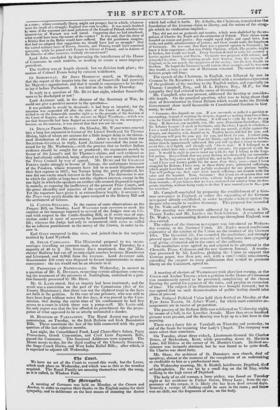Eby flftetroporil.
A meeting of Germans was held on Monday, at the Crown and Anchor, M order to. express their thanks to the English nation for their sympathy, and to deliberate on the best means of -resisting the decree
which had called it forth. Dr. Schulte, the Chairman, remarked on the fotmdation of the German claim to liberty, and the nature of the strug.. gle which its vindication implied - They did not rest on protocols and treaties, which were abolished by the ex pulsion of Charles the Tenth and the extinction of Poland. Their claims were founded on reason and justice : they sought equal rights and equal laws, free trade, and public administration ofjustice; and these would make the happiness of Germany. He was sure that there was a general opinion in Germany.; he knew it from experience-that was Public Opinion, NvIlich, like granite, might. be broken, but would not bend. Every German desired to make Ids country a barrier against Austria and Russia. Germany was pregnant with science, and demanded freedom. The working people wen known, froin the example of England, to be not merely the supporters of the soeiety, but the best friends tat freedom. He hoped the Germans would imitate their example, and be WitS sure they would, as long as one son of Herrmann remained. The contest was one. between people mid kings. The speech of the Chairman, in English, was followed by one irr German by Dr.Kreutzner. ; who concluded with a resolution expressive of the gratitude of the meeting to the English nation, and especially to Thomas Campbell, Esq., and H. L. Bulwer, Esq., M.P., for the sympathy they had evinced in the cause of Germany. Mr. Campbell, who was present, addressed the meeting at consider- able length. On the practical question, what was to bring about that state of determination in Great Britain which would make the British Government show itself favourable to Constitutional freedom in Ger many, he said- " Germans, this depends on you. If you succumb, or make it a question e succumbing, instead of resisting the despots, depend on nothing from Great Bri- tain, for Great Britain will do nothing. It will not he right for her to do an thing. If, however, you manfully rise, like your Alemannian forefathers-like the Achaian League-I speak to Germans, and, therefore!, I speak to scholars- I we a word familiar to you-if you rise, with one accord, to fight against the despots, not shunning war, depend on it, English hearts will feel for you, and. Englishmen will pray for you, pay for you, and bleed for you. I exhort you, therefore, Germans, to risk your lives for liberty, and die free in glorious battle, rather than be ignominously suffocated. But you will say that it iseasy to recom- mend this-it is lightly and cheaply said, ' Go to war.' If I belonged to a country which bore only a nation of political cowards, the reproach \multi be just. It would be right in you to taunt me with it ; but I belong to the Eng-- )ish nation. Do you think that our great Reform was obtained by our succumb- big? In the long course of my political life, aud in the political lives of others -and I have now known public life for more than thirty years-since I have struggled for Reform, I have seen, in those thirty ream, protracted sufferings, which might have been well and joyfully exchanged for one glorious battle Youwill perhaps say, that out's were moral suffinings, not wounds with the sabre and the bayonet. True, Germans ! But if you are of opinion that we have come through our late awful crisis, without hieing prepared to encounter these wounds,-if you believe that we have extricated our country front its des- perate situation, without being wady to do that I new counsel you to do,-your.are mistaken."
Mr. Campbell concluded by proposing the establishment of a Ger- man newspaper in England, or rather the supporting of the German newspaper already established, in order to create a battery against the despots who sought to enslave Germany. This proposal was seconded by Dr. Wade, and agreed to.
The meeting was afterwards addressed by a Mr. Savage a Mr_ GeorgeYorke, and Mr. Lawless the Irish barrister. A resolution of Dr. Wade's, recommending district meetings throughout Enghnid, was.. also carried.
The subject of the German newspaper was introduced on Wednes- day evening, at time National Union. Mr. Taylor moved resolutions expressive of the opinion of the Union on the conduct of the Germart Diet. The Reverend Mr. Fox seconded time resolutions, and strongly pressed upon the meeting the necessity of lendiug more than sympathy -of giving substantial aid to the cause of the sufferers. The resolutions were agreed to, and ordered to be advertised in the Chronicle, Times, 6' alignani, and the new German Journal. A resolu- tion presented by Mr. Lawless, pledging the Union to support the German paper, was then put, and, with a cow: ,1..:rable amendment, extending the support to every publication that tended to promote liberty on the Continent, agreed to.


























 Previous page
Previous page